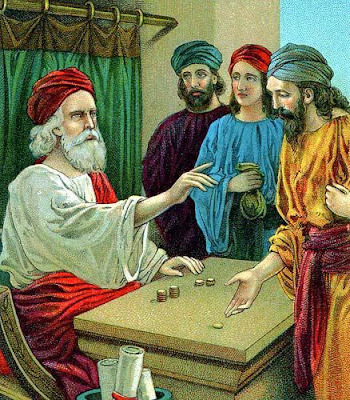YOU ARE ACCOUNTABLE FOR YOUR CHOICE: RISK OR PERISH.
November 15, 2020
Thirty-third Sunday in Ordinary Time - A.
A Senegalese proverb says, “It is only the eagle that can
give an account of the whisper of the cloud.” And a Japanese proverb adds,
“Even a fool has one talent.”
Discussing one day with a friend, he asked me about judgment
and damnation, how can we understand the mercy of God in front of the reality
of hell? My answer to him was: ‘It is not God who judges and condemns us, but
our actions and choices. Therefore, we should take the risk to dare the good
always and show love to anyone we meet if we dream of heaven. For, hell is the
fruit of our choice.’
The Catechism of the Catholic Church comes in great support
to this answer when it states: “Each man receives his eternal retribution in
his immortal soul at the very moment of his death, in a particular judgment
that refers his life to Christ: either entrance into the blessedness of
heaven-through a purification or immediately, or immediate and everlasting
damnation. At the evening of life, we shall be judged on our love” (CCC.1022).
Today’s liturgy, 33rd Sunday of the year A, tells us clearly
that only the one who takes no risk to do good is condemned. It is therefore a
duty for each of us to work for our salvation by exercising ministries in our
communities, our societies, and in the world. Heaven is not the sum of our
human and spiritual laziness but of works of love. Therefore, it will be opened
only to he who contributes to its edification here on earth.
St. Paul, in the second reading, emphasizes that element. He
exhorts the Thessalonians to be alert and at work so that the day of the Lord
will not catch them by surprise. The Apostle sets forth rules of what should be
the life of a Christian in light of the coming of the Lord. The first and
greatest of all these rules is obviously the awareness, to stay awake. This
meets the message of last Sunday. Stay awake, be watchful, keep our lamp, our
faith ignited. Because we are disciples of Christ, children of the light, we
should not let ourselves be surprised by his coming. We should not behave like
the children of darkness. An emphasis is put on the opposition between light
and darkness. The children of light live in sobriety and alert, while those of
darkness take pleasure in drunkenness, unbelief, and all kinds of evil. As
result, because of their lifestyle, they will see sudden destruction falling on
them. His actions are what either condemns or saves man, not God.
The first reading will meet this call to action by
portraying the industrious woman. The characteristics of the godly woman as
presented here should also be those of any Christian. The godly woman, says the
author of the Proverbs, is more precious than rubies. She surpasses any other
woman in virtue. She is industrious, striving to provide for the good of her
family, tirelessly at work, cares for her household. Not only so, but she is
also generous with the less fortunate and the poor. Her hand is always opened
and extended to the needy. This woman, as here described, is the perfect image
of the disciple of Christ. The Christian is called to be one who, knowing to be
precious to the Lord, put actions to raise the rights and the dignity of
others, with a preferential option for the marginalized and the forgotten of
our societies. Through doing so, he assures himself a bright future in God’s
kingdom.
The best-of of today’s liturgy will come from the Gospel,
the parable narrated by Jesus. The Lord, in this parable clearly emphasizes
three attitudes or elements that will serve as a module for our judgment:
responsibility, reliability, and accountability. In front of God, and in our
relationship with him, we all stand responsible, reliable, and accountable for
all that he gave us. As we can read it in the parable, the master who knows the
capacities of his servants entrusted each of them with a specific talent, “each
one according to his ability.”
God will never give you what you are not able to do or
beyond your capability. Consequently, he will not ask you for an account of
what he has not given you. If he asks you an account of love, it is because he
has first loved you and emblazoned his love into your heart. So, it is up to
each one to take the risk of being industrious, invest the best as he can the
precious gifts of God. We will be judged on the basis of what we did with God’s
gift. We should keep it clear in mind that we are not using our own treasure,
but rather the treasure of God. Therefore, we have the obligation to give him a
clear account of our management of his property. He does not tolerate our
laziness or fear to risk.
Brethren, to each one of us, God gave the capacity to love
and to be loved. Love is expected to be productive. If we fail to make fruitful
our love through works of mercy and assistance to the needy, if we close our
heart and eyes to their needs, synonymous of burying our talents, we will stand
responsible, reliable, and accountable of our choice, and regrettably, we will
be withdrawn from God’s love and thrown into the eternal damnation, “into the
darkness outside, where there will be wailing and grinding of teeth.”





Comments
Post a Comment